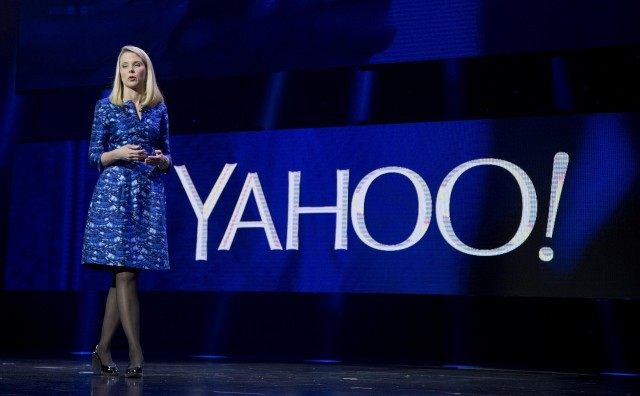Although Marissa Mayer has brought stability and mobile growth to Yahoo over the last three years, after the company went through four failed CEOs, activist hedge funds are bringing out the long knives to threaten dumping Mayer.
Yahoo’s stock price tripled in the first two years after Mayer joined a collapsing Yahoo in 2012. As a software engineer, long-time usability leader, and key spokesperson for Google, it was thought that Mayer would take her pedigree and grab the top reins of some start-up with a “unicorn” billion-dollar valuation. Instead she shocked “The Street” and took the reins of Silicon Valley’s biggest loser.
But from the mid-teens price, Mayer’s gift of gab and new stability drove the stock up to over $50 a share this time last year. But it has fallen back by almost -35 percent as stability without growth is dead-money in the markets.
New York hedge fund managing director and angry shareholder Eric Jackson of Ader Investment Management referred to the situation: “This is like an ‘emperor has no clothes’ situation.” He told the Silicon Valley Journal, “The company and the shareholders would be better served with her leaving.”
SunTrust analyst Robert Peck, who has skewered Yahoo or Mayer for years, sent a letter to Yahoo’s Board, supposedly reflecting the views of a group of his institutional clients, demanding that Mayer should be dumped.
All the angst about Yahoo is related to the fact that Yahoo’s 15 percent ownership stake of China’s Alibaba e-commerce giant is now worth about $30 billion. Given the current market price of Yahoo, 87 percent of its stock value is an investment in a Chinese company. That means the rest of Yahoo only has a $4.5 billion residual value.
Looking at the other Yahoo pieces, Yahoo has $7 billion in cash, a 35 percent stake in Yahoo Japan valued by Reuters at $8.8 billion, and its core operating businesses.
Yahoo operations are divided along the lines of a strong and a weak story. The strong story is Yahoo’s “MaVeNS” business that includes mobile, video, native advertising, and social. The weak story is legacy desktop advertising and display.
Yahoo’s third quarter revenue of $1.226 billion moved up at about a +7 percent rate. But MaVeNS revenue jumped 60 percent in the second quarter and 43 percent in the third to $422 million. That means the legacy two thirds of Yahoo is declining.
If Yahoo was a “MaVeNS” company, it would have up to an $8 to $15 billion valuation on a screaming 50 percent growth rate that would be similar to Tableau (NYSE:DATA) or FireEye (NASDAQ:FEYE), according Brian Nichols at Premium Research.
Adding in $7 billion in cash and stake in Yahoo Japan worth nearly $16 billion, Yahoo appears to be a “deep-value” play. But even with the Aabaco Holdings (Alibaba stock) being spun-off in January, the problem with “deep value” is that it can take a long time before becoming priced as “real valued” in stock markets.
Perhaps the biggest investor negative for Yahoo is that with 87 percent of its market value due to holdings of a Chinese stock, Yahoo is suffering guilt-by-association with the continuing Chinese stock market crash.
“Red Dragon” stock indexes plunged by an average of -5.4 percent on November 27, and those indexes are down a similar to Yahoo -38 percent for the year. Although the hedge funds are screaming for a CEO change, no one can deflect Yahoo’s China problem until after the spin-off of Alibaba shares in January.
An increasing number of analysts are following Yahoo, with about 60 percent now rating Yahoo shares a “buy” or “strong buy.” The analysts seem to hope that Yahoo’s “deep-value” gets priced into the stock price over the next couple of months.

COMMENTS
Please let us know if you're having issues with commenting.